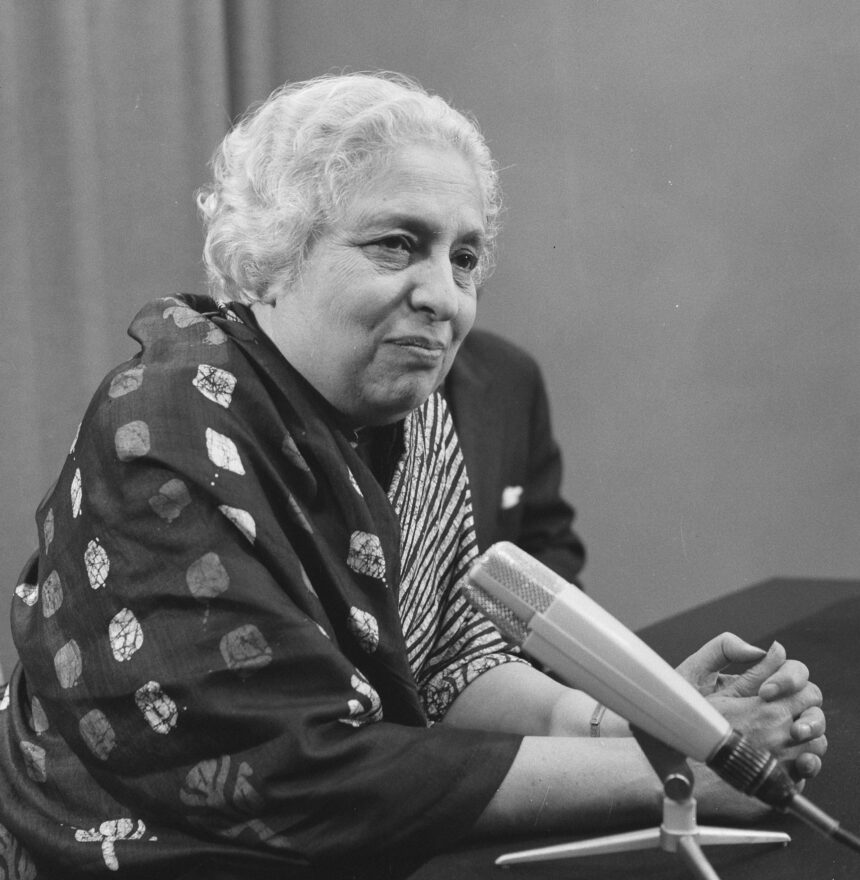Vijaya Lakshmi Pandit: 6 Powerful Ways She Shaped India’s Political Landscape
Vijaya Lakshmi Pandit, an extraordinary woman in India’s political history, played an instrumental role in shaping the country’s future after its independence. As the first woman to become the president of the United Nations General Assembly, she was not only a symbol of strength and resilience but also a tireless advocate for women’s rights and global peace. Her contributions to India’s political and diplomatic sphere have left an indelible mark on both national and international stages.
Early Life and Education
Vijaya Lakshmi Pandit was born on August 18, 1900, in Allahabad, India, into a family of prominent intellectuals. Her father, Motilal Nehru, was a famous lawyer and a leader of the Indian National Congress, while her brother Jawaharlal Nehru would later become the first Prime Minister of India. Raised in a politically charged atmosphere, she was deeply influenced by the freedom movement from an early age.
Vijaya Lakshmi was educated at home and then at the prestigious Oxford University in England. Her education exposed her to Western political thought and ideas of social justice, both of which would later shape her career. A keen observer of social and political events, she was deeply impacted by the struggles for independence, women’s rights, and the broader movement for global peace.
Political Career and Leadership
- A Key Figure in India’s Freedom Struggle
While her brother, Jawaharlal Nehru, took center stage in the Indian independence movement, Vijaya Lakshmi Pandit also played an active role. She was a dedicated member of the Indian National Congress, participating in various movements to free India from British colonial rule. Her political views were shaped by the ideologies of Mahatma Gandhi, and she closely worked with him during the Quit India Movement.Her active involvement in the struggle for independence included taking part in protests, leading campaigns, and enduring imprisonments. In many ways, she became a symbol of the active participation of women in the fight for freedom.
- The First Female President of the United Nations General Assembly
One of the most significant milestones in Vijaya Lakshmi Pandit’s career was her election as the President of the United Nations General Assembly in 1953. She became the first woman in history to hold this prestigious position, breaking barriers for women in global politics.During her time at the United Nations, she was a passionate advocate for the peaceful resolution of international conflicts and played a crucial role in promoting India’s foreign policy of non-alignment. Her leadership at the UN was celebrated globally, and it established her as a prominent figure in international diplomacy.
- Promoting Women’s Rights and Empowerment
Throughout her life, Vijaya Lakshmi Pandit championed the cause of women’s rights. She was instrumental in advocating for women’s participation in politics, education, and social life. Her views were progressive for her time, and she believed that the key to India’s development lay in the empowerment of its women.As an influential leader, she sought to create a society where women could fully participate in all aspects of public and private life. She was an ardent supporter of women’s education and worked to improve women’s political representation in India. Her contributions to the upliftment of women continue to inspire women leaders around the world.
- Governorship and Public Service
Vijaya Lakshmi Pandit served as the Governor of Maharashtra from 1962 to 1967, becoming the first woman to hold such a high office in India. As governor, she worked to improve the state’s infrastructure and support its development efforts. Her leadership and administrative skills earned her immense respect in political circles.In addition to her governorship, Pandit held several other key positions, including India’s Ambassador to the Soviet Union and Spain. In each role, she played an important part in strengthening India’s diplomatic relations and enhancing its global standing.
- A Strong Advocate for Peace and Non-Violence
Vijaya Lakshmi Pandit’s political philosophy was deeply influenced by the teachings of Mahatma Gandhi. She strongly believed in non-violence and peace, not only in India’s internal politics but also in global relations. During her time at the United Nations, she worked tirelessly to foster global peace, participating in debates and negotiations aimed at resolving international conflicts through peaceful means.Her diplomatic skills were a testament to her ability to balance India’s national interests with her desire for global harmony. Her efforts towards peace continue to be remembered as one of the defining features of her political career.
- Legacy of Integrity and Service
Vijaya Lakshmi Pandit’s legacy is one of integrity, determination, and service to her country and the world. She was a pioneer who broke down gender barriers in politics and international diplomacy. Her career, from her early days in the independence movement to her tenure at the United Nations, serves as an inspiration to all women leaders, showing that one can achieve greatness with hard work, passion, and conviction.Her passing in 1990 was a great loss, but her legacy lives on through the many women and men who have been inspired by her achievements. Today, she remains a role model for political leaders across the globe.
Key Facts About Vijaya Lakshmi Pandit
- Full Name: Vijaya Lakshmi Pandit
- Born: August 18, 1900, Allahabad, India
- Died: December 1, 1990, Pune, India
- Key Roles: President of the United Nations General Assembly, Governor of Maharashtra, Indian Ambassador to the Soviet Union and Spain
- Major Contributions: Advocate for women’s rights, active participant in India’s independence movement, non-violence and peace advocate, global diplomat.
Vijaya Lakshmi Pandit’s Significance and Impact
Vijaya Lakshmi Pandit’s life had an immense impact on both India and the world. As a political leader and diplomat, she not only contributed to India’s independence but also helped shape the post-independence political landscape. Her advocacy for women’s rights, her leadership at the United Nations, and her commitment to peace are part of her enduring legacy.
In a world where political barriers and gender biases still exist, Vijaya Lakshmi Pandit serves as a powerful reminder of what one woman can achieve. She broke through societal norms and carved out a space for women in the highest echelons of global politics, paving the way for future generations of women leaders.
Frequently Asked Questions (FAQs)
1. What is Vijaya Lakshmi Pandit known for?
Vijaya Lakshmi Pandit is known for being the first woman to preside over the United Nations General Assembly, her leadership in the Indian independence movement, and her advocacy for women’s rights and global peace.
2. What was Vijaya Lakshmi Pandit’s role in India’s independence?
She was actively involved in the Indian freedom struggle and was a prominent member of the Indian National Congress, participating in several protests and campaigns.
3. How did Vijaya Lakshmi Pandit contribute to global peace?
Through her leadership at the United Nations, she worked to promote peace and diplomacy, advocating for peaceful resolutions to international conflicts.
4. Did Vijaya Lakshmi Pandit have any significant roles after India’s independence?
Yes, she served as the Governor of Maharashtra and as India’s Ambassador to the Soviet Union and Spain, contributing to India’s diplomatic efforts on the global stage.
5. What is Vijaya Lakshmi Pandit’s legacy?
Her legacy includes breaking gender barriers in politics and diplomacy, her commitment to women’s empowerment, and her work for global peace and non-violence.
Conclusion
Vijaya Lakshmi Pandit’s life and career were a testament to the power of determination, resilience, and dedication to service. As a pioneering woman in Indian politics and global diplomacy, her contributions continue to resonate today. Her legacy inspires countless individuals to pursue their goals, regardless of gender or societal constraints. As we remember her achievements, we honor the lasting impact she made on India and the world.











Hi to every one, it’s really a fastidious for me to visit this website, it includes
useful Information.